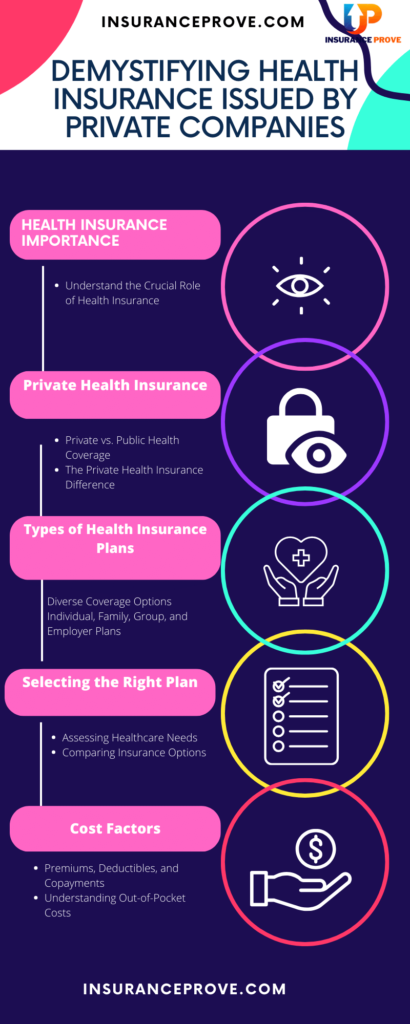Health insurance issued by private companies offers individuals a range of coverage options beyond what public health programs provide. These policies are tailored to meet the specific needs and preferences of policyholders, offering a more personalized approach to healthcare coverage.
Health Insurance Issues
The Significance of Health Insurance
In today’s rapidly changing world, understanding the significance of “what is health insurance issued by private companies” is crucial. Health insurance provides a safety net that safeguards your well-being and financial stability during illness or injury. It offers peace of mind, ensuring that you have access to quality healthcare when you need it most.
Private Health Insurance Explained
Private health insurance is one of the critical avenues through which individuals and families can access healthcare services. Unlike public health insurance, which the government provides, private health insurance is offered by private companies. These private companies create various insurance plans tailored to meet the diverse healthcare needs of individuals and groups.
What is health insurance issued by private companies?
Defining Private Health Insurance
Private health insurance, or private medical insurance (PMI), is coverage individuals and families purchase from private insurance companies. It offers financial protection by covering a portion or all of the medical expenses incurred during illnesses, injuries, or other health-related issues.
Types of Private Health Insurance Plans
Private health insurance plans come in various forms, each designed to cater to specific needs. Some common types include individual plans, family plans, group plans, and employer-sponsored plans. Unique programs are tailored to a single person, while family plans cover multiple family members. Group plans are typically offered to organizations, and employer-sponsored methods are provided as part of an employment package.

Coverage and Benefits of Private Health Insurance
What Private Health Insurance Covers
Private health insurance typically covers a range of medical services, such as hospital stays, doctor’s visits, surgeries, prescription drugs, and preventive care. The extent of coverage can vary significantly based on the specific plan you choose.
Additional Benefits and Riders
In addition to basic coverage, private health insurance plans may offer additional benefits and riders. These include dental and vision coverage, maternity benefits, mental health services, and wellness programs. Riders allow you to customize your plan to suit your needs better.
Selecting the Right Insurance Plan
Assessing Your Healthcare Needs
Choosing the right private health insurance plan begins with assessing your healthcare needs. Consider factors like your age, medical history, family size, and any pre-existing conditions. Understanding what services you’ll need will help you select the most appropriate plan.
Comparing Insurance Plan Options
Private insurance companies offer a range of plans with varying levels of coverage and cost. It’s essential to compare different options, including the types of coverage, premiums, deductibles, and copayments. Make sure the plan aligns with your healthcare requirements and financial capacity.
Private Insurance Companies Cost Factors
Premiums, Deductibles, and Copayments
Health insurance plans come with various cost components. Premiums are the monthly fees you pay for coverage, while deductibles are the amount you must pay out of pocket before insurance coverage kicks in. Copayments are fixed prices you pay for specific services.
Understanding Out-of-Pocket Costs
Out-of-pocket costs refer to the expenses you must cover yourself, such as deductibles, copayments, and any medical services not fully covered by your insurance. Understanding these costs is vital for budgeting and managing your healthcare expenses.
Private Health Insurance Network Options
In-Network vs. Out-of-Network Providers
Private health insurance plans often have a network of preferred healthcare providers. Visiting in-network providers usually results in lower out-of-pocket costs. Out-of-network providers may cost more or not be covered at all.
Provider Networks and Access
Provider networks vary between insurance companies and plans. It’s essential to ensure that your preferred healthcare providers, such as doctors and hospitals, are part of the plan’s network to ensure smooth access to care.
Private health insurance: Pre-Existing Conditions
How Pre-Existing Conditions Affect Coverage
Private health insurance companies may handle pre-existing conditions differently. Some may exclude coverage for existing health issues, while others may cover them after a waiting period. Understanding “what is health insurance issued by private companies” or how your plan takes pre-existing conditions is crucial.
Waiting Periods and Exclusions
Waiting periods are when coverage for pre-existing conditions may not be available. Exclusions refer to specific requirements or treatments that are not covered at all. You must be aware of any waiting periods and exclusions in your policy.
private health insurance plan Enrollment and Renewal
Open Enrollment Periods
Open enrollment periods allow you to sign up for or change your private health insurance plan. Missing these periods can limit your options.
Special Enrollment Circumstances
Exceptional enrollment circumstances, such as marriage, the birth of a child, or job loss, may allow you to enroll or make changes to your plan outside of the regular open enrollment period.
Health Insurance Claims and Reimbursements
Filing Health Insurance Claims
To access your benefits, you’ll need to file health insurance claims. This involves submitting documentation of your medical expenses to your insurance company.
Insurance Company Reimbursement Process Explained
After filing a claim, your insurance company will review the documentation and, if approved, reimburse you for eligible expenses. Understanding the reimbursement process can help you navigate the financial aspects of your healthcare.
Private Health Insurance vs. Public Options
Private vs. Public Health Insurance
Private health insurance differs from public options, such as Medicare and Medicaid, in that private companies provide it. General options are often government-funded and available to specific demographics.
Pros and Cons of Private Health Insurance
“what is health insurance issued by private companies?” offers greater flexibility and a broader range of choices, but it comes with a cost. Public options may provide more affordable coverage but could have limitations regarding providers and services.

Policyholder Rights and Responsibilities
Understanding Your Rights
As a policyholder, you have certain rights, such as access to covered services and appeal claim denials. Understanding your rights ensures you receive the benefits you’re entitled to.
Obligations as a Policyholder
Policyholders also have responsibilities, such as paying premiums on time, providing accurate information, and abiding by the policy terms.
Health Insurance Regulatory Landscape
Health Insurance Regulations
Private health insurance is subject to regulations that vary by jurisdiction. These regulations are in place to protect consumers and ensure fair practices by insurance companies.
Consumer Protection Laws
Consumer protection laws exist to safeguard the interests of policyholders. Familiarize yourself with these laws to know your rights and the legal protections.
Life Insurance Changes and Adjusting Coverage
Marriage, Birth, and Other Life Events
Life events such as marriage, the birth of a child, or divorce may require adjustments to your health insurance coverage. Be aware of how these events can impact your policy.
Modifying Your Health Insurance
You can modify your health insurance plan to reflect changes in your life circumstances. This may involve adding or removing family members from the policy or adjusting coverage levels.
Coping with Premium Increases Insurance
Factors Affecting Premiums
Premiums can change over time due to various factors, such as age, health status, and inflation. Understanding these factors can help you cope with premium increases.
Strategies to Manage Costs
To manage rising premiums, consider strategies like shopping around for a new plan, adjusting your coverage, or taking advantage of wellness programs offered by your insurer.
Coping with Denied Claims
Reasons for Claim Denials
Claim denials can occur for various reasons, such as errors in documentation or services not covered by your policy. Knowing the common reasons for denials can help you avoid them.
Insurance Appeals and Resolutions
If your claim is denied, you can appeal the decision. Understanding the appeals process and how to navigate it can increase your chances of a successful resolution.
The Role of Brokers and Agents
Health Insurance Brokers
Health insurance brokers are professionals who can help you navigate the complex world of private health insurance. They can provide guidance, compare plans, and assist with enrollment.
How They Can Help You
Brokers can help you find a plan that aligns with your needs and budget. They know the different options available and can streamline selecting a plan.
Wellness and Preventive Care
Promoting Wellness through Insurance
Many private health insurance plans offer wellness programs and incentives to encourage healthy lifestyle choices. These programs can lead to better health outcomes and reduced medical costs.
Preventive Care Coverage
Preventive care, such as vaccinations and screenings, is a crucial aspect of private health insurance. Most plans cover preventive services, helping to detect and prevent health issues before they become severe.
International Health Insurance and Travel Coverage
Health Insurance for International Travel
Private health insurance plans may offer coverage for international travel. It’s essential to understand the extent of this coverage and consider additional travel insurance if necessary.
Temporary Coverage Options
For temporary stays abroad, you may have options for securing travel insurance or extending your current coverage. Ensure you are adequately protected while traveling.

The Future of Private Health Insurance
Evolving Trends and Innovations
The private health insurance industry is continually evolving. Keeping an eye on emerging trends and innovations can help you stay informed about new options and services.
What to Expect in the Future
The future of private health insurance may include more personalized plans, enhanced digital services, and innovative cost-saving measures. Stay informed to make well-informed choices.
Conclusion
Securing Your Health and Financial Well-being
Private health insurance issued by private companies is a valuable tool for securing your health and financial well-being. By understanding the intricacies of private health insurance, you can make informed decisions that protect you and your loved ones.
Making Informed Health Insurance Choices
Making the right health insurance choices is crucial for your peace of mind and quality of life. By considering your unique needs, understanding the options available, and staying informed, you can navigate the world of private health insurance with confidence.
FAQs (Frequently Asked Questions)
Here are some frequently asked questions (FAQs) related to “What is health insurance issued by private companies ?”
What factors should I consider when choosing a private health insurance plan?
A: When choosing a private health insurance plan, consider your medical needs, budget, family size, and preferred healthcare providers. Evaluate the type of coverage, premiums, deductibles, and copayments to ensure the plan aligns with your specific requirements.
What is health insurance issued by private companies?
A: Private health insurance is coverage provided by private insurance companies that individuals or organizations purchase to help cover the costs of medical expenses. It differs from public options like Medicare or Medicaid, which are government-funded programs designed to provide healthcare coverage to specific demographics. Private health insurance offers more flexibility and customization but comes at a cost, while public options are often subsidized and have specific eligibility criteria.
How do pre-existing conditions affect private health insurance coverage?
A: Pre-existing conditions may affect private health insurance coverage differently depending on the insurer and the plan. Some insurers may exclude coverage for pre-existing conditions, while others may cover them after a waiting period. It’s essential to understand how your program handles pre-existing conditions and any associated waiting periods or exclusions.
What are the common reasons for denied claims, and how can I appeal a denial?
A: Common reasons for denied claims include errors in documentation, services not covered by your policy, or issues with the provider’s billing. To appeal a denial, follow the appeals process outlined by your insurance company. Provide additional information, documentation, or clarification to support your claim, and work with your insurer to resolve the issue.
What is the role of health insurance brokers, and how can they help me find the right plan?
A: Health insurance brokers specialize in helping individuals and organizations navigate the complex world of health insurance. They can assess your needs, compare various plans, and provide guidance on selecting the right strategy. Brokers can streamline the enrollment process and provide valuable insights to help you make an informed choice.
What trends and innovations can we expect in the future of private health insurance?
A: The future of private health insurance will likely involve more personalized plans, enhanced digital services for managing policies and claims, and innovative cost-saving measures. Additionally, there may be advancements in telemedicine, wellness programs, and data-driven health management to improve the overall healthcare experience for policyholders. Stay informed about emerging trends to make well-informed choices in the evolving insurance landscape.
In summary, understanding what health insurance issued by private companies entails is essential for making informed choices about your healthcare coverage. By delving into the various aspects of private health insurance,